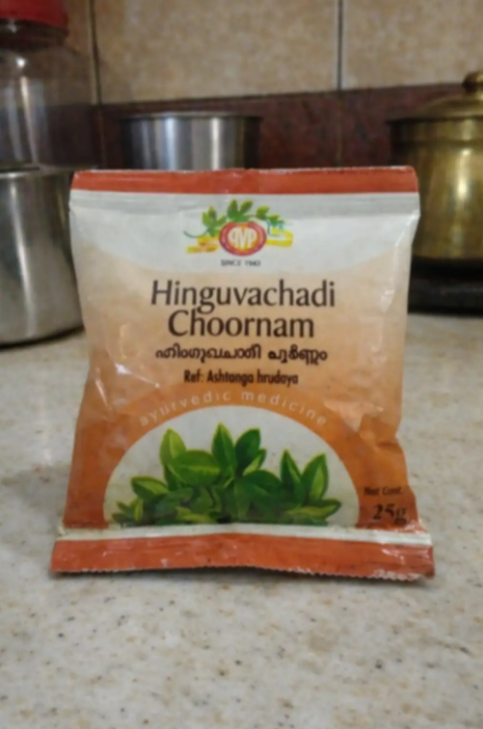Key Benefits of AVP Hinguvachadi Choornam
- Supports healthy digestion and eases indigestion discomfort
- Reduces abdominal bloating & gas build-up quickly
- Relieves colicky pain from internal spasms
- Helps regulate appetite and nutrient absorption
- Traditionally used to ease cough and mild respiratory distress
- Promotes weight management and metabolic balance
- Antispasmodic action soothes smooth muscle cramps
Product Description of AVP Hinguvachadi Choornam
AVP Hinguvachadi Choornam is an age-old Ayurvedic herbal powder crafted to bring gentle relief to digestive woes. It’s kind of rustic in feel — the aroma of asafoetida (Hingu) hits you first, then a warm, earthy scent of mixed herbs. People often reach for it when they feel bloated after a heavy meal or battling recurrent indigestion. You stir a small dose into warm water or buttermilk and sip it down, almost meditative, you know?
The formula blends traditional wisdom with simple, natural ingredients that have been used in India for centuries. At its heart, Asafoetida and Vacha work to relax gut tension, while Trikatu spices (black pepper, long pepper & ginger) help kindle your digestive “agni” (inner fire). Over time, you may notice reduced gas, better appetite regulation and even relief from intermittent abdominal cramps. Some users have mentioned light quick relief from occasional cough or mild asthma-flare ups too — though it’s primarily a gut remedy.
This choornam isn’t magic fairy-dust, but a tried-and-tested support in Ayurvedic clinics. It’s dosed conservatively (1–3 g once or twice daily) so you can feel the benefits without overdoing it. You might feel a gentle warmth as it works through your system — a sign that things are moving in the right direction. Anyway, it’s perfect if you’re seeking that old-school natural approach and don’t mind a bit of strong herbal flavor!
Key ingredients with descriptions of AVP Hinguvachadi Choornam
- Shuddha Hingu (Asa foetida) – Traditional carminative used to relieve abdominal gas.
- Vacha (Acorus calamus) – Aromatic herb known for supporting digestive tone.
- Vijaya (Terminalia chebula) – Revered as a mild laxative and digestive aid.
- Pashugandha (Cleome gynandra) – Traditionally applied to ease gastrointestinal discomfort.
- Dadima (Punica granatum) – Fruit rind used for its astringent and digestive properties.
- Dipyaka (Trachyspermum ammi) – Carom seed valued for relief of indigestion and bloating.
- Dhanyaka (Coriandrum sativum) – Coriander seed with cooling and digestive support.
- Patha (Cyclea peltata) – Herb used in Ayurveda for gentle gut toning.
- Pushkara (Inula racemosa) – Root traditionally employed for abdominal and respiratory comfort.
- Shati (Hedychium spicatum) – Known for its aromatic warming effect on the digestive system.
- Hapusha (Sphaeranthus indicus) – Utilized to relieve localized swelling and digestive issues.
- Agni (Plumbago zeylanica) – Root herb used to stimulate digestive fire.
- Yavakshara (Hordeum vulgare) – Barley-based alkali employed for balancing digestive pH.
- Svarjikakshara – Ayurvedic alkaline salt used to soothe the GI tract.
- Saindhava Lavana – Natural rock salt for electrolyte balance.
- Sauvarchala Lavana – Himalayan salt variant valued in classical texts.
- Vida Lavana – Baked salt used to regulate digestive moisture.
- Shunti (Zingiber officinale) – Ginger root prized for carminative action.
- Maricha (Piper nigrum) – Black pepper to kindle digestive fire.
- Pippali (Piper longum) – Long pepper used for its warming, digestive qualities.
- Ajaji (Cuminum cyminum) – Cumin seed known to relieve bloating.
- Chavya (Piper chaba) – Spicy pepper used to support gut motility.
- Tintidika (Rhus parviflora) – Herb traditionally used against indigestion.
- Vetasamla (Garcinia morella) – Fruit rind employed for metabolic support.
Key uses of AVP Hinguvachadi Choornam
- Indigestion, dyspepsia and loss of appetite
- Chronic bloating and intestinal gas relief
- Colicky abdominal pain from spasms
- Sprue and malabsorption syndromes
- Diarrhoea with accompanying cramps
- Aiding respiratory discomfort like mild cough/asthma
- Weight management support in PCOS (complementary use)
How to use AVP Hinguvachadi Choornam
Take 1–3 g (about ½ to 1 teaspoon) once or twice daily. Mix in warm water or buttermilk. Best before meals to aid digestion. Follow your practitioner’s advice for long-term use. Do not exceed recommended dose.
Safety information about AVP Hinguvachadi Choornam
- Children: Lower doses (½ of adult dose) under supervision; monitor for sensitivity.
- Pregnant women: Avoid use unless directed by an Ayurvedic doctor.
- Breastfeeding mothers: Generally safe at lower dose, but consult practitioner.
- People with chronic diseases: Check with physician, esp. hypertension or salt-restricted diets.
- People with allergies: Avoid if hypersensitive to any individual herb or asafoetida.
- Elderly individuals: Start with smaller dose, ensure adequate hydration.
- Patients taking medications: May interact with diuretics or antihypertensives; seek medical advice.
- People with weakened immunity: Use caution, follow professional guidance.
Additional information about AVP Hinguvachadi Choornam
Store in a cool, dry place, away from direct sunlight. Shelf life: 2 years from manufacture. This product is uncoated and free from synthetic fillers. The taste is potent, earthy and may linger; that’s a sign of raw herbs at work. Quality-tested and produced in GMP-certified facility. Not for use in very emaciated individuals or men trying to conceive, due to presence of alkali salts that may affect sperm parameters. Always maintain consistency for best effects—and be patient: Ayurveda shifts take time.
